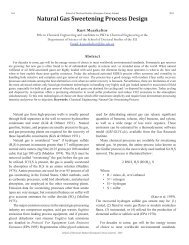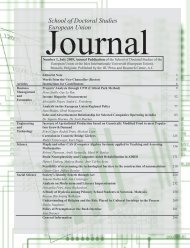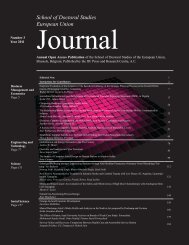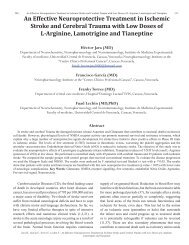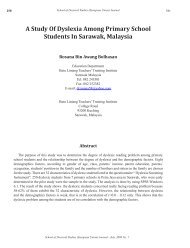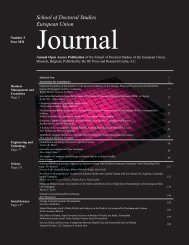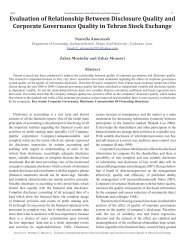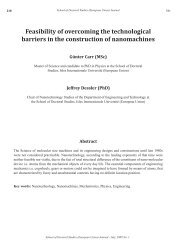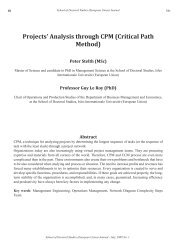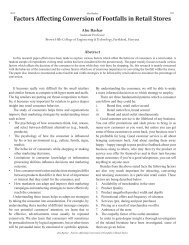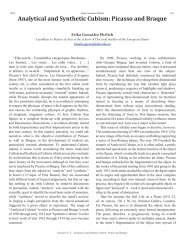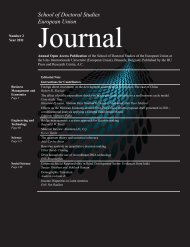Policy of Preemption or the Bush Doctrine - Isles International ...
Policy of Preemption or the Bush Doctrine - Isles International ...
Policy of Preemption or the Bush Doctrine - Isles International ...
Create successful ePaper yourself
Turn your PDF publications into a flip-book with our unique Google optimized e-Paper software.
2009 <strong>Policy</strong> <strong>of</strong> <strong>Preemption</strong> <strong>or</strong> <strong>the</strong> <strong>Bush</strong> <strong>Doctrine</strong><br />
281<br />
<strong>Policy</strong> <strong>of</strong> <strong>Preemption</strong> <strong>or</strong> <strong>the</strong> <strong>Bush</strong> <strong>Doctrine</strong><br />
Ana Dresner (MPhill)<br />
Master <strong>of</strong> Philosophy and Candidate to PhD in Anthropology at <strong>the</strong><br />
<strong>Isles</strong> <strong>International</strong>e Université (European Union)<br />
Abstract<br />
The paper explains <strong>the</strong> principles <strong>of</strong> <strong>the</strong> <strong>Bush</strong> <strong>Doctrine</strong> and <strong>the</strong> policy <strong>of</strong> preemption that was essentially <strong>the</strong><br />
response <strong>of</strong> <strong>the</strong> <strong>Bush</strong> administration to <strong>the</strong> attacks <strong>of</strong> 9/11. The paper looks at <strong>the</strong> arguments <strong>of</strong> supp<strong>or</strong>ters<br />
<strong>of</strong> <strong>the</strong> <strong>Bush</strong> doctrine but <strong>the</strong>n expl<strong>or</strong>es <strong>the</strong> position <strong>of</strong> opponents as well. The paper discusses <strong>the</strong> rise <strong>of</strong><br />
anti-Americanism, <strong>the</strong> contentions that <strong>Bush</strong> disregards <strong>the</strong> will and needs <strong>of</strong> <strong>the</strong> states he has invaded, <strong>the</strong><br />
fact that democratization is not w<strong>or</strong>king and <strong>the</strong> lack <strong>of</strong> evidence about weapons <strong>of</strong> mass destruction at <strong>the</strong><br />
start <strong>of</strong> <strong>the</strong> second Iraq war.<br />
A. Dresner - <strong>Policy</strong> <strong>of</strong> <strong>Preemption</strong> <strong>or</strong> <strong>the</strong> <strong>Bush</strong> <strong>Doctrine</strong>
282<br />
School <strong>of</strong> Doct<strong>or</strong>al Studies (European Union) Journal<br />
July<br />
The terr<strong>or</strong>ist attacks <strong>of</strong> 9/11 were a defining<br />
moment in both American f<strong>or</strong>eign policy and <strong>the</strong><br />
lives <strong>of</strong> millions <strong>of</strong> people. The lives that were<br />
claimed by <strong>the</strong> attacks have left thousands and<br />
thousands <strong>of</strong> family members and an entire nation<br />
grieving. The attacks that were immediately<br />
condemned throughout <strong>the</strong> w<strong>or</strong>ld were regarded<br />
as <strong>the</strong> beginning <strong>of</strong> <strong>the</strong> war on terr<strong>or</strong>ism in <strong>the</strong><br />
United States where President Ge<strong>or</strong>ge W. <strong>Bush</strong><br />
announced America was ready to fight back. The<br />
“<strong>Bush</strong> doctrine” as American f<strong>or</strong>eign policy has<br />
been called, is essentially <strong>the</strong> response <strong>of</strong> <strong>the</strong> <strong>Bush</strong><br />
administration to <strong>the</strong> attacks <strong>of</strong> 9/11. Initially, it was<br />
used to describe <strong>the</strong> invasion <strong>of</strong> Afghanistan, but<br />
was later broadened as to encompass <strong>the</strong> famous<br />
“policy <strong>of</strong> preemption” which was claimed to<br />
operate on various levels. First <strong>of</strong> all, this strategy<br />
<strong>of</strong> preemption holds that <strong>the</strong> United States can<br />
attack any country and depose any political regime<br />
if <strong>the</strong>y pose a security threat on <strong>the</strong> U.S. The threat<br />
does not have to be immediate, and <strong>the</strong> security<br />
threat can be ei<strong>the</strong>r terr<strong>or</strong>ism <strong>or</strong> <strong>the</strong> development<br />
<strong>of</strong> weapons <strong>of</strong> mass destruction. This also justified<br />
<strong>the</strong> invasion <strong>of</strong> Iraq. Secondly, <strong>the</strong> policy <strong>of</strong><br />
preemption was described by <strong>the</strong> administration<br />
as a strategy supp<strong>or</strong>ting democracy all over <strong>the</strong><br />
w<strong>or</strong>ld, especially in <strong>the</strong> Middle East. The third<br />
set <strong>of</strong> principles <strong>of</strong> <strong>the</strong> <strong>Bush</strong> doctrine refers to a<br />
diplomacy tending toward “unilateralism” i.e.<br />
“a willingness to act without <strong>the</strong> sanction <strong>of</strong><br />
international bodies such as <strong>the</strong> United Nations<br />
Security Council <strong>or</strong> <strong>the</strong> unanimous approval <strong>of</strong> its<br />
allies” (Kagan: 17).<br />
The <strong>Bush</strong> doctrine was fur<strong>the</strong>r developed in<br />
<strong>the</strong> National Security Strategy paper issued by <strong>the</strong><br />
White House on September 17,2002. This paper<br />
announced “a new legal as well as strategic concept<br />
that would represent a fundamental change from <strong>the</strong><br />
past” (Gardner: 586): “The United States will not<br />
use f<strong>or</strong>ce in all cases to preempt emerging threats,<br />
n<strong>or</strong> should nations use preemption as a pretext f<strong>or</strong><br />
aggression. Yet in an age where <strong>the</strong> enemies <strong>of</strong><br />
civilization openly and actively seek <strong>the</strong> w<strong>or</strong>ld’s<br />
most destructive technologies, <strong>the</strong> United States<br />
cannot remain idle while dangers ga<strong>the</strong>r.” (The<br />
National Security Strategy <strong>of</strong> The United States <strong>of</strong><br />
America 15 Sept. 2002 in Gardner: 586)<br />
Supp<strong>or</strong>ters <strong>of</strong> <strong>the</strong> <strong>Bush</strong> doctrine claim that<br />
nuclear weapons pose a deterrent threat to <strong>the</strong><br />
United States, and that “hopes f<strong>or</strong> a stable and<br />
democratized Islamic w<strong>or</strong>ld, f<strong>or</strong> example, may<br />
be sh<strong>or</strong>t-lived if Iraq <strong>or</strong> Iran were to acquire such<br />
a capability. We see already how <strong>the</strong> tiny N<strong>or</strong>th<br />
K<strong>or</strong>ean arsenal - and its proclivities to proliferate<br />
- could confound America’s position as <strong>the</strong><br />
guarant<strong>or</strong> <strong>of</strong> East Asian security and democracy.”<br />
(Donnelly, The Logic <strong>of</strong> American Primacy)<br />
M<strong>or</strong>eover, <strong>the</strong>y argue that American principles,<br />
interests, and systemic responsibilities argue<br />
strongly in fav<strong>or</strong> <strong>of</strong> an active and expansive stance<br />
<strong>of</strong> strategic primacy and a continued willingness<br />
to employ military f<strong>or</strong>ce (Ibid) On <strong>the</strong> o<strong>the</strong>r hand,<br />
<strong>the</strong>re are increasingly m<strong>or</strong>e voices which supp<strong>or</strong>t<br />
<strong>the</strong> idea that <strong>the</strong> preemptive war which lies at <strong>the</strong><br />
heart <strong>of</strong> <strong>the</strong> <strong>Bush</strong> doctrine has long been viewed<br />
as “imm<strong>or</strong>al, illicit, and imprudent” (Bacevich:<br />
2007). In addition, <strong>the</strong> “quick, economical, and<br />
decisive vict<strong>or</strong>y in Iraq” (Ibid) that <strong>the</strong> <strong>Bush</strong><br />
administration had aimed at has failed to occur<br />
as <strong>the</strong> war has produced different consequences<br />
such as heightening <strong>the</strong> anti-American hatred<br />
which already existed, and alienating American<br />
friends and f<strong>or</strong>mer supp<strong>or</strong>ters <strong>of</strong> American f<strong>or</strong>eign<br />
policy.<br />
The occupation stage <strong>of</strong> <strong>the</strong> Iraqi war that<br />
<strong>the</strong> U.S. is now engaged in is extremely costly,<br />
with around $4 billion per month. Aside from <strong>the</strong><br />
economic point <strong>of</strong> view, <strong>the</strong> military occupation<br />
<strong>of</strong> Iraq is counterproductive in <strong>the</strong> fight against<br />
Anti-American terr<strong>or</strong>ists especially because<br />
international cooperation is essential in <strong>or</strong>der to<br />
annihilate terr<strong>or</strong>ist <strong>or</strong>ganizations, and <strong>the</strong> U.S.<br />
has not received much supp<strong>or</strong>t in <strong>the</strong>ir military<br />
operation in Iraq. M<strong>or</strong>eover, <strong>the</strong> U.S. occupation<br />
<strong>of</strong> Iraq has cost <strong>the</strong> lives <strong>of</strong> hundreds <strong>of</strong> American<br />
servicemen and servicewomen and has left a few<br />
thousand wounded <strong>or</strong> disabled. As far as Iraqi loss<br />
<strong>of</strong> life, <strong>the</strong> numbers are staggering. Acc<strong>or</strong>ding to<br />
Associated Press, at least 3,240 Iraqi civilians<br />
were killed during <strong>the</strong> combat stage <strong>of</strong> operations,<br />
i.e. between March and May, 2003 (Preble: 6).<br />
Thesis: This paper strives to illustrate that <strong>the</strong> U.S.<br />
occupation <strong>of</strong> Iraq has contributed to a deeper sense<br />
<strong>of</strong> insecurity at home on <strong>the</strong> part <strong>of</strong> Americans, and<br />
School <strong>of</strong> Doct<strong>or</strong>al Studies (European Union) Journal - July, 2009 No. 1
2009 <strong>Policy</strong> <strong>of</strong> <strong>Preemption</strong> <strong>or</strong> <strong>the</strong> <strong>Bush</strong> <strong>Doctrine</strong><br />
283<br />
has not helped reduce <strong>the</strong> magnitude <strong>of</strong> w<strong>or</strong>ldwide<br />
terr<strong>or</strong>ism. On <strong>the</strong> contrary, it has increased <strong>the</strong><br />
wave <strong>of</strong> anti-American hatred. Also, as far as<br />
international cooperation, it has left <strong>the</strong> United<br />
States ra<strong>the</strong>r unpopular and lonely.<br />
The claim that Iraq was developing weapons<br />
<strong>of</strong> mass destruction was central to <strong>the</strong> current<br />
administration’s decision to wage war against Iraq.<br />
By invoking this particular reason, <strong>the</strong> supp<strong>or</strong>ters<br />
<strong>of</strong> <strong>the</strong> war knew that <strong>the</strong>y were appealing to one<br />
<strong>of</strong> America’s greatest fears, i.e. <strong>the</strong> prospect <strong>of</strong><br />
anti-American terr<strong>or</strong>ists seizing control <strong>of</strong> nuclear<br />
weapons. As President <strong>Bush</strong> f<strong>or</strong>mulated it,<br />
preemptive war was seen as a solution <strong>of</strong> deterring<br />
o<strong>the</strong>r nations that might have been in <strong>the</strong> process<br />
<strong>of</strong> developing nuclear weapons programs: “f<strong>or</strong><br />
diplomacy to be effective, w<strong>or</strong>ds must be credible,<br />
and no one can now doubt <strong>the</strong> w<strong>or</strong>d <strong>of</strong> America.”<br />
(Ge<strong>or</strong>ge W. <strong>Bush</strong>, press release January 20, 2004<br />
as quoted in Preble: 26). The administration<br />
claimed that <strong>the</strong> United States’ involvement in<br />
Iraq determined countries such as Libya, Iran<br />
and N<strong>or</strong>th K<strong>or</strong>ea to abandon <strong>the</strong>ir initial plans to<br />
develop weapons <strong>of</strong> mass destruction. None<strong>the</strong>less,<br />
Iran and N<strong>or</strong>th K<strong>or</strong>ea have openly reaffirmed <strong>the</strong>ir<br />
desire to expand <strong>the</strong>ir nuclear programs.<br />
American f<strong>or</strong>eign policy has not been exactly<br />
coherent (Gardner: 585). America has <strong>of</strong>fered its<br />
supp<strong>or</strong>t to Israel which clashed with <strong>the</strong> attempts<br />
to w<strong>or</strong>k with Arab states. Collab<strong>or</strong>ation with <strong>the</strong><br />
British impeded better relations with <strong>the</strong> emerging<br />
countries <strong>of</strong> <strong>the</strong> Middle East, and also threatened<br />
to undermine <strong>the</strong> security <strong>of</strong> <strong>the</strong> region that <strong>the</strong>se<br />
very ties were meant to protect (Kuniholm: 433).<br />
This incoherence has only deepened in <strong>the</strong> last few<br />
years, and has given rise to a number <strong>of</strong> suspicions<br />
within <strong>the</strong> international community. The presence<br />
<strong>of</strong> U.S. troops in Iraq does not eliminate <strong>the</strong> threat<br />
<strong>of</strong> nuclear weapons. In fact, since <strong>the</strong> allies have<br />
not been able to locate any such weapons on<br />
<strong>the</strong> Iraqi territ<strong>or</strong>y, American occupation sends<br />
troubling signals about American f<strong>or</strong>eign policy<br />
and <strong>the</strong> U.S.’s intentions as far as o<strong>the</strong>r nations <strong>of</strong><br />
<strong>the</strong> w<strong>or</strong>ld. These suspicions are directly linked to<br />
Iraq’s oil resources and have generated <strong>the</strong> idea<br />
that <strong>the</strong> United States is an imperialistic state.<br />
These suspicions have been used by Al Qaeda<br />
and o<strong>the</strong>r terr<strong>or</strong>ist <strong>or</strong>ganizations in <strong>the</strong>ir attempt to<br />
recruit new members.<br />
President <strong>Bush</strong> argued that <strong>the</strong> war against<br />
Saddam Hussein was part <strong>of</strong> <strong>the</strong> large scale<br />
war on terr<strong>or</strong>ism waged by America after 9/11.<br />
None<strong>the</strong>less, Al Qaeda still maintains terr<strong>or</strong>ist<br />
cells throughout <strong>the</strong> w<strong>or</strong>ld, even in developed<br />
countries. Never<strong>the</strong>less, <strong>the</strong> center <strong>of</strong> Al Qaeda<br />
has remained in Afghanistan where <strong>the</strong> Taliban<br />
rule has been preferred to open civil war. In fact,<br />
<strong>the</strong> <strong>or</strong>ganization has benefited from <strong>the</strong> situation<br />
in Iraq. As with all maj<strong>or</strong> terr<strong>or</strong>ist <strong>or</strong>ganizations,<br />
a po<strong>or</strong> and humiliated population is an easy prey.<br />
Al Qaeda has found supp<strong>or</strong>t in Iraq where its<br />
anti-American propaganda deeply resonated with<br />
<strong>the</strong> Iraqi people. At first, <strong>the</strong> administration had<br />
domestic supp<strong>or</strong>t f<strong>or</strong> going to Iraq as Saddam’s<br />
regime was presented as “a threat <strong>of</strong> unique<br />
urgency” (Ge<strong>or</strong>ge W. <strong>Bush</strong>, Project f<strong>or</strong> <strong>the</strong> New<br />
American Century, “Statement on Post-War Iraq”<br />
in Preble: 14) which determined Americans to view<br />
Iraq as a anti-American dictat<strong>or</strong>ship that possessed<br />
weapons <strong>of</strong> mass destruction, and thus needed to be<br />
neutralized (Preble: 15). The link between Saddam<br />
Hussein and Al Qaeda has not been proved, and<br />
Saddam’s involvement in 9/11 has remained solely<br />
an element <strong>of</strong> American administration rhet<strong>or</strong>ic, as<br />
President <strong>Bush</strong> associated Saddam’s dictat<strong>or</strong>ship<br />
with terr<strong>or</strong>ism: “The battle <strong>of</strong> Iraq is one vict<strong>or</strong>y<br />
in a war on terr<strong>or</strong> that began on September 11,<br />
2001.” (G.W. <strong>Bush</strong>, 2003). However, no pro<strong>of</strong> <strong>of</strong><br />
this association has ever been located. This lack <strong>of</strong><br />
pro<strong>of</strong> has generated domestic disbelief in <strong>the</strong> Iraqi<br />
war, but m<strong>or</strong>e imp<strong>or</strong>tantly perhaps, it has enhanced<br />
<strong>the</strong> anger and resentment felt by Iraqis towards <strong>the</strong><br />
U.S. and its citizens. Fur<strong>the</strong>rm<strong>or</strong>e, it has w<strong>or</strong>sened<br />
America’s image throughout <strong>the</strong> w<strong>or</strong>ld and has<br />
severely discredited <strong>the</strong> U.S. “war on terr<strong>or</strong>”.<br />
The conflict is not between civilizations<br />
but within states, within cultures and within an<br />
increasingly global community “over <strong>the</strong> values<br />
and ideas that underpin modernizations and <strong>the</strong><br />
n<strong>or</strong>ms and directions <strong>of</strong> modern civilization”<br />
(Kuniholm: 426) The enemy <strong>of</strong> democratic states<br />
is international terr<strong>or</strong>ism, an elusive enemy<br />
which cannot be confronted without international<br />
cooperation (Kuniholm: 430). Fur<strong>the</strong>rm<strong>or</strong>e,<br />
A. Dresner - <strong>Policy</strong> <strong>of</strong> <strong>Preemption</strong> <strong>or</strong> <strong>the</strong> <strong>Bush</strong> <strong>Doctrine</strong>
284<br />
School <strong>of</strong> Doct<strong>or</strong>al Studies (European Union) Journal<br />
July<br />
if states supp<strong>or</strong>t terr<strong>or</strong>ist <strong>or</strong>ganizations, and<br />
help <strong>the</strong>m propagate and gain new members,<br />
international cooperation must be targeted at<br />
<strong>the</strong> states in question so that <strong>the</strong>ir supp<strong>or</strong>t is<br />
annihilated. This has been one <strong>of</strong> <strong>the</strong> explanations<br />
f<strong>or</strong> <strong>the</strong> American presence in Iraq. However, <strong>the</strong><br />
presence <strong>of</strong> American troops has not considerably<br />
changed <strong>the</strong> situation in Iraq where democracy has<br />
still not penetrated <strong>the</strong> collective conscience <strong>or</strong> <strong>the</strong><br />
political system. In fact, American involvement in<br />
Iraq might actually suppress such political and<br />
social development. The violence has spread from<br />
Sunni to Shiite communities (Preble: 54) and<br />
from central Iraq to regions in <strong>the</strong> south and west<br />
(Ibid.).<br />
One <strong>of</strong> <strong>the</strong> goals <strong>of</strong> <strong>the</strong> <strong>Bush</strong> doctrine is to spread<br />
democracy to <strong>the</strong> Middle East. In fact, <strong>the</strong> central<br />
claim that supp<strong>or</strong>ters <strong>of</strong> <strong>the</strong> Iraqi occupation have<br />
f<strong>or</strong>mulated is that <strong>the</strong> US troops are contributing<br />
to <strong>the</strong> creation <strong>of</strong> a stable and democratic Iraq<br />
(Preble: 45). M<strong>or</strong>eover, <strong>the</strong>y have argued that<br />
governments in neighb<strong>or</strong>ing countries could follow<br />
in <strong>the</strong> path <strong>of</strong> Iraq and adopt peaceful democratic<br />
regimes. This is however easily contradicted by<br />
a few hist<strong>or</strong>ical and social considerations. Ethnic<br />
and religious cleavages prevent such a scenario<br />
from ever becoming reality. Since its creation,<br />
Iraq has been a nation t<strong>or</strong>n between immense<br />
social inequalities and religious differences. The<br />
lack <strong>of</strong> education has also w<strong>or</strong>sened <strong>the</strong> situation<br />
<strong>of</strong> <strong>the</strong> Iraqi people. In fact, this lack <strong>of</strong> education<br />
combined with extreme poverty account f<strong>or</strong><br />
<strong>the</strong> appeal <strong>of</strong> terr<strong>or</strong>ism among common Iraqis.<br />
M<strong>or</strong>eover, Iraq has no experience in liberal and<br />
pluralistic government hence America’s attempt to<br />
create and impose such a regime is likely to fail. It<br />
is extremely difficult to craft a regime that will also<br />
function when put into practice especially when it<br />
is imposed through military intervention. A study<br />
conducted in 2003 has shown that only 4 <strong>of</strong> <strong>the</strong><br />
16 military operations through which <strong>the</strong> United<br />
States aimed at changing a government resulted<br />
in <strong>the</strong> establishment <strong>of</strong> democracy (Pei, Minxin;<br />
Kasper, Sara in Preble: 46).<br />
The process <strong>of</strong> democratization largely depends<br />
on hist<strong>or</strong>ical developments and cannot be reduced<br />
to a matter <strong>of</strong> imposing <strong>the</strong> right institutions in<br />
Iraq. Democracy is based upon political freedom<br />
which can only be acquired by a state when <strong>the</strong><br />
latter benefits from economic growth, a solid<br />
level <strong>of</strong> education and a coherent national identity<br />
(Preble: 49). Given <strong>the</strong> ethnic turmoil, low rate <strong>of</strong><br />
education and <strong>the</strong> high percentage <strong>of</strong> Iraqi people<br />
living below <strong>the</strong> poverty line, it is obvious that <strong>the</strong><br />
United States cannot simply change <strong>the</strong> political<br />
life <strong>of</strong> <strong>the</strong> country.<br />
The level <strong>of</strong> hatred f<strong>or</strong> Americans is growing,<br />
and <strong>the</strong> populations <strong>of</strong> <strong>the</strong> Middle East are without<br />
a doubt, <strong>the</strong> center <strong>of</strong> this hatred. Islam is not a<br />
nation, but many Muslims express a kind <strong>of</strong><br />
religious nationalism, and <strong>the</strong> leaders <strong>of</strong> radical<br />
Islam, including Al-Qaeda seek to establish a<br />
<strong>the</strong>ocratic nation <strong>or</strong> confederation <strong>of</strong> nations that<br />
would encompass a large p<strong>or</strong>tion <strong>of</strong> <strong>the</strong> Middle East<br />
and beyond. Like national movements elsewhere,<br />
“Islamists have a yearning f<strong>or</strong> respect, including<br />
self-respect, and a desire f<strong>or</strong> hon<strong>or</strong>” (Kagan: 23).<br />
Complete withdrawal would be synonymous<br />
to a reaffirmation <strong>of</strong> American’s intentions not<br />
to suppress <strong>the</strong> aspirations <strong>of</strong> <strong>the</strong> Iraqi people.<br />
This could be much m<strong>or</strong>e than a mere symbolic<br />
gesture, as <strong>the</strong> populations inhabiting this region<br />
<strong>of</strong> <strong>the</strong> w<strong>or</strong>ld would no longer feel as threatened<br />
and controlled by America, which in turn, might<br />
lead to a decrease in terr<strong>or</strong>ist activities directed at<br />
<strong>the</strong> United States. As far as <strong>the</strong> domestic response<br />
to <strong>the</strong> occupation <strong>of</strong> Iraq, it is imp<strong>or</strong>tant to note<br />
here that American intervention in Iraq is no longer<br />
supp<strong>or</strong>ted at home where policymakers have been<br />
confronted with a severe loss in domestic supp<strong>or</strong>t<br />
f<strong>or</strong> <strong>the</strong> war (Preble: 58).<br />
In <strong>or</strong>der f<strong>or</strong> <strong>the</strong>se anti-terr<strong>or</strong>ism eff<strong>or</strong>ts to be<br />
successful, <strong>the</strong>y must draw on an internationally<br />
accepted code that not only stipulates <strong>the</strong> n<strong>or</strong>ms<br />
<strong>of</strong> behavi<strong>or</strong> f<strong>or</strong> states in <strong>the</strong> region, but also<br />
<strong>the</strong> elements <strong>of</strong> cooperation (Kuniholm: 435).<br />
Although <strong>the</strong>re are “reasonable-sounding <strong>the</strong><strong>or</strong>ies<br />
as to why America’s position should be eroding”<br />
(Kagan: 20) as a result <strong>of</strong> global opposition<br />
to <strong>the</strong> war and <strong>the</strong> unpopularity <strong>of</strong> <strong>the</strong> current<br />
administration, <strong>the</strong>re has been little measurable<br />
change in <strong>the</strong> actual policies <strong>of</strong> nations, o<strong>the</strong>r than<br />
<strong>the</strong>ir reluctance to assist <strong>the</strong> United States in Iraq<br />
(Ibid). However, American occupation <strong>of</strong> Iraq has<br />
School <strong>of</strong> Doct<strong>or</strong>al Studies (European Union) Journal - July, 2009 No. 1
2009 <strong>Policy</strong> <strong>of</strong> <strong>Preemption</strong> <strong>or</strong> <strong>the</strong> <strong>Bush</strong> <strong>Doctrine</strong><br />
285<br />
also created <strong>the</strong> image <strong>of</strong> an imperialistic America<br />
which has isolated itself from its traditional allies<br />
by focusing on reshaping w<strong>or</strong>ld politics. In this<br />
sense, President G.W. <strong>Bush</strong> has been accused <strong>of</strong><br />
wanting to establish w<strong>or</strong>ld <strong>or</strong>der acc<strong>or</strong>ding to his<br />
own principles disregarding <strong>the</strong> will and needs <strong>of</strong><br />
<strong>the</strong> states that he has invaded, such as in <strong>the</strong> case<br />
<strong>of</strong> Afghanistan and Iraq. In turn, this has given rise<br />
to an immense wave <strong>of</strong> anti-Americanism which<br />
has deteri<strong>or</strong>ated <strong>the</strong> image <strong>of</strong> America w<strong>or</strong>ldwide.<br />
By withdrawing militarily from Iraq, <strong>the</strong> message<br />
that <strong>the</strong> United States would be sending would be<br />
extremely powerful. Both <strong>the</strong> Middle East and<br />
<strong>the</strong> rest <strong>of</strong> <strong>the</strong> w<strong>or</strong>ld would be reassured that <strong>the</strong><br />
intention <strong>of</strong> America is not to take control <strong>of</strong> <strong>the</strong> oil<br />
resources as it has been speculated. Fur<strong>the</strong>rm<strong>or</strong>e,<br />
<strong>the</strong> American administration must acknowledge<br />
<strong>the</strong> fact that <strong>the</strong> process <strong>of</strong> democratization is<br />
highly complex, and that democracy cannot be<br />
simply carried and implemented from one place<br />
to ano<strong>the</strong>r. American f<strong>or</strong>eign policy must redirect<br />
towards real threats such as global terr<strong>or</strong>ism, and<br />
must consider embracing a position that will allow<br />
America to resume international cooperation<br />
which would end its phase <strong>of</strong> loneliness and<br />
unpopularity.<br />
Bacevich, Andrew J. 2007, ‘Rescinding <strong>the</strong><br />
<strong>Bush</strong> <strong>Doctrine</strong>’, The Boston Globe, 1 March,<br />
(electronic edition) < http://www.boston.<br />
com/news/globe/edit<strong>or</strong>ial_opinion/oped/<br />
articles/2007/03/01/rescinding_<strong>the</strong>_bush_<br />
doctrine/ ><br />
Donnelly, Thomas. 2003, ‘The Underpinnings <strong>of</strong><br />
<strong>the</strong> <strong>Bush</strong> <strong>Doctrine</strong>’, National Security Outlook<br />
AEI Online (Washington), American Enterprise<br />
Institute f<strong>or</strong> Public <strong>Policy</strong> Research. < http://<br />
www.aei.<strong>or</strong>g/publications/pubID.15845/pub_<br />
detail.asp<br />
Gardner, Richard N. 2003, ‘Nei<strong>the</strong>r <strong>Bush</strong> n<strong>or</strong><br />
<strong>the</strong> “Jurisprudes”’, The American Journal <strong>of</strong><br />
<strong>International</strong> Law, vol. 97, vol. 3, pp. 585-<br />
590.<br />
Kagan, Robert. 2007, ‘End <strong>of</strong> Dreams, Return <strong>of</strong><br />
Hist<strong>or</strong>y’, <strong>Policy</strong> Review, no. 144, pp. 17-26.<br />
Kuniholm Bruce R. 2002, ‘9/11, <strong>the</strong> Great Game,<br />
and <strong>the</strong> Vision Thing: The Need f<strong>or</strong> (And<br />
Elements <strong>of</strong>) a M<strong>or</strong>e Comprehensive <strong>Bush</strong><br />
<strong>Doctrine</strong>’ The Journal <strong>of</strong> American Hist<strong>or</strong>y,<br />
vol. 89, no. 2, pp. 426-438.<br />
Preble, Christopher. 2004. Exiting Iraq: Why <strong>the</strong><br />
U.S. Must End <strong>the</strong> Military Occupation and<br />
Renew <strong>the</strong> War against Al Qaeda : Rep<strong>or</strong>t <strong>of</strong><br />
a Special Task F<strong>or</strong>ce, Washington, DC, Cato<br />
Institute.<br />
A. Dresner - <strong>Policy</strong> <strong>of</strong> <strong>Preemption</strong> <strong>or</strong> <strong>the</strong> <strong>Bush</strong> <strong>Doctrine</strong>



